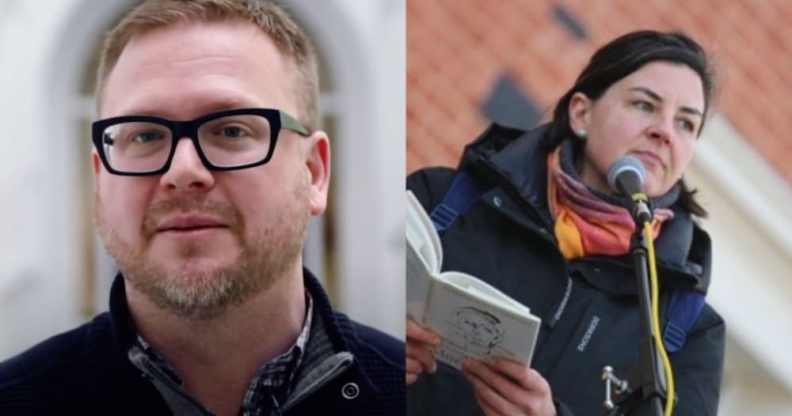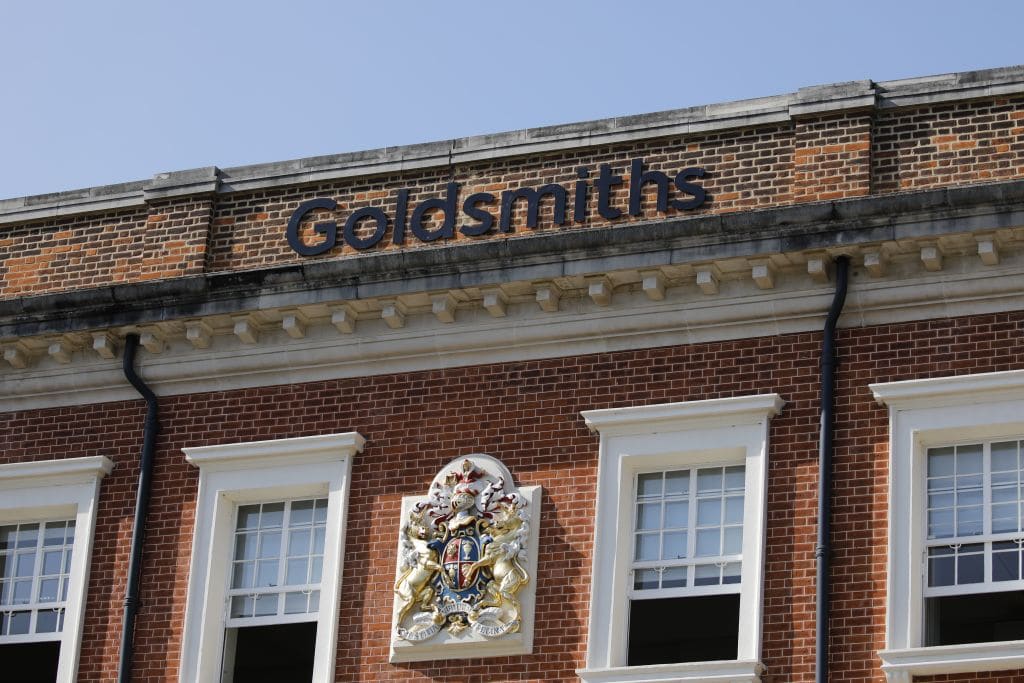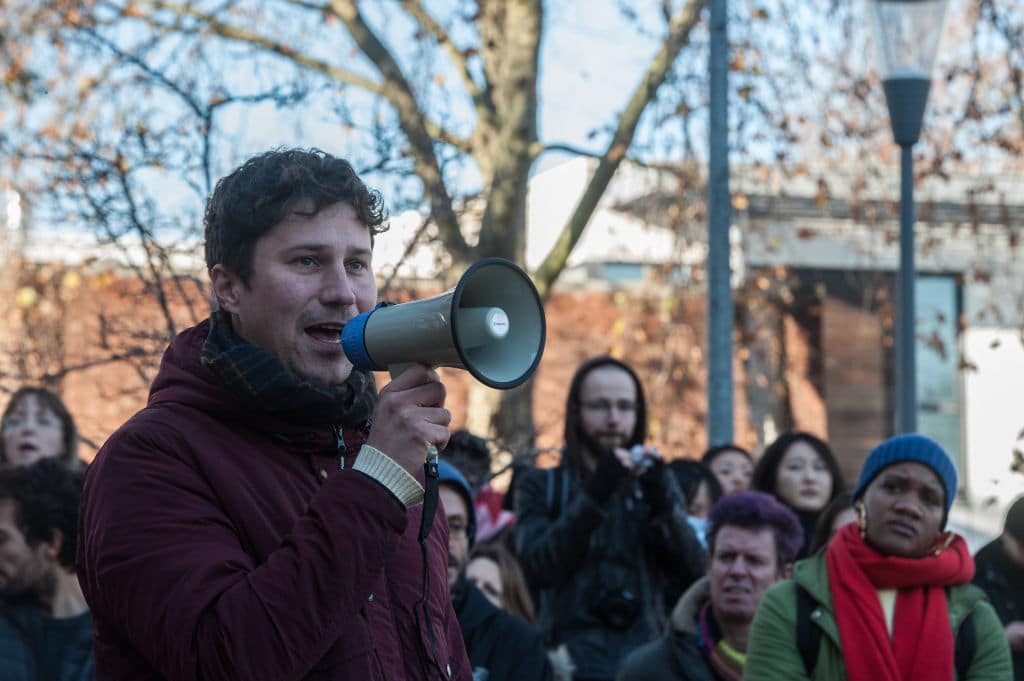World’s first queer history degree faces axe as staff fight for jobs during LGBT History Month

Justin Bengry and Kave Davison. (Provided)
Goldsmiths university’s queer history masters degree is under threat because the staff who run it could be made redundant.
Five years ago, Goldsmiths, University of London launched the world’s first ever master’s degree in queer history. It was spearheaded by Dr Justin Bengry, and in September 2021, Dr Kate Davison moved from Berlin to London to take up a position on the course.
Just six weeks later, Davison, Bengry and other staff in the departments of history, English and creative writing received letters notifying them that their jobs were at risk of redundancy. Queer history isn’t the only course at risk – the master’s degree in Black British history is also under threat.
Both lecturers say that, if they’re let go, the course would be unviable – especially at master’s level, where extensive knowledge and understanding of an area is needed to teach.
“I wasn’t even in the job for six weeks before I got a letter saying my job might be cancelled,” Davison tells PinkNews. She was “devastated” when she received the letter – she had uprooted her entire life to teach at Goldsmiths.
“It was like having a bucket of water poured all over these visions and dreams that I had, but also the predominant feeling that I’ve been having throughout this whole process is just discombobulation,” Davison explains. “It has been extremely discombobulating because it seems as though the goalposts keep moving. Management tells us ‘we’re committed to queer history’ but then they put us at risk of redundancy.”
‘Goldsmiths offers courses in queer history to bolster its own image’
In the months that have elapsed since that letter arrived, Davison – who has recently accepted a position at a different university – has become increasingly cynical about what Goldsmiths is trying to achieve by offering specialist courses like queer history and Black British history.
“From my perspective as a new person coming into the college, it seems to me that Goldsmiths management is very interested in continuing its profile as a progressive and possibly even a radical college with these areas of research and these areas of teaching – queer history, Black British history, Black British literature. It is very interested in maintaining that profile, but I have to honestly say, all the evidence that I’ve seen so far points to this being a very cynical use of these areas of teaching to promote an image of the college that in my observation so far doesn’t match what’s going on on the ground.”
Davison is now concerned that Goldsmiths will choose not to fill the vacancy she leaves behind as part of their cost-cutting measures.

A picture shows the facade of Goldsmiths, University of London, in London on August 13, 2019. (TOLGA AKMEN/AFP via Getty)
“Goldsmiths is now using the fact that staff are seeking other opportunities as a way to reduce staff without actually having to make individuals redundant, but what it still means is cancellation of the position,” she says. “The university has given no assurances as yet that they will rehire someone to replace me.”
The furore is particularly painful for Bengry, who has built the master’s degree in queer history up from the ground over five years. He says the process that imperils it has been “long, drawn out and painful”.
“We’re at the stage now of having individual consultations to discuss the process by which our skills to teach in our field will be evaluated, which is truly astonishing,” he says. “They’ve left both Kate and I ‘in scope’, the terminology they use, because the college claims there may be other staff in the department qualified to teach in queer history. This also is astonishing because other than Kate and I, not a single person in our department has ever published a significant thing in queer history, and certainly between Kate and I, I’m confident we know every other person in the country qualified to work in our roles.”
People just think, ‘Any historian can teach queer history, they just have to talk about queers,’ which is a total misunderstanding of what we do.
If he and Davison are let go, the master’s in queer history “could not operate”, Bengry says. Such a move would “undermine the credibility of the programme and undermine any claim for the quality of the degree”.
“The fact that Kate and I are officially in scope of redundancy demonstrates precisely the existential threat to the programme, because the programme cannot run without us in place. Even if the MA in queer history remains at the end of this restructure, the stated goal is to cut the department of history roughly by half, meaning we would be operating in an eviscerated department which denies queer history students exposure to so many wider histories.”
Both Bengry and Davison are concerned that, if they’re made redundant, non-specialist staff could end up teaching queer history instead.
“People just think, ‘Any historian can teach queer history, they just have to talk about queers,’ which is a total misunderstanding of what we do,” Davison says.

The scene on the main forecourt at Goldsmiths university as staff begin three weeks of strike action against job cuts on November 23, 2021 in London, England. (Guy Smallman/Getty)
“These are incredibly resilient communities. They are also communities that have collectively been exposed to a great amount of harm. And the idea that somebody who specialises in military strategy in the Second World War can just come in and suddenly start teaching about the history of oppression is preposterous.”
They’re not really concerned about the optics of placing queer history at risk even in the context of LGBT History Month.
As of now, Bengry and Davison understand that they will find out the fate of their roles in late March. The staff who are being let go will then be given three months notice and will leave their positions at the end of June – before master’s students have even submitted their dissertations.
“They’re giving us very difficult, fudging messages, so it’s very difficult to have an emotional reaction because you’re not really sure what’s being communicated to you,” Davison says. “It seems to me that one of the strategies by management is to keep us all in a state of confusion because it makes us less capable of having a reaction one way or the other. It’s very difficult to know what to feel and what to think because the messaging is so mixed and the goalposts keep shifting.”
The whole thing is made worse by the fact that she and Bengry are facing meetings that are part of the process to determine their ability to teach in their areas of expertise during LGBT+ History Month (February).
“To me, that’s an indication that the management has a plan and they’re going to go through with it irrespective of the reactions or the context or the optics of how it looks. They want to use queer studies to improve the college’s image but at the same time they’re not really concerned about the optics of placing queer history at risk even in the context of LGBT History Month.”
Queer history is ‘vital’ – it’s not a ‘quirky’ specialisation
As far as Davison is concerned, LGBT+ history is vital – it’s not a side issue or a “quirky area of specialisation”. She is urging Goldsmiths management to recognise the importance of their discipline, and the disciplines of historians focusing on marginalised histories more broadly.
“Some of the most cutting edge innovations are happening in the field of queer history or LGBT history,” Davison says. “If that’s lost, it’ll be a disadvantage to history as a whole.”
When approached for comment, a spokesperson for Goldsmiths, University of London said: “The reality is Goldsmiths needs to save £9 million in ongoing spend by 2023 to put the college back on a sustainable financial footing. As no one has been able to suggest viable alternative proposals which would deliver these savings a number of staff remain at risk of redundancy. We will continue to support and advise those affected and work to minimise the number of redundancies across the college.
“Goldsmiths remains committed to teaching the humanities as part of a varied teaching and learning offering including the disciplines of history, English and creative writing.”

